Shih-Chieh Dai (戴士捷)
Salt Lake City, UT
I am a first-year PhD student at the Kahlert School of Computing, the University of Utah. I am working on Machine Learning Security advised by Prof. Guanhong Tao. I completed my M.S. in Information Science at the University of Texas at Austin. My research interests are primarily in Code LLM Security and NLP Applications.
I started my NLP journey as an NLP research assistant in Natural Language Processing and Sentiment Analysis (NLPSA) Lab at Academia Sinica supervised by Dr. Lun-Wei Ku.
My research at NLPSA included Fake News Intervention, such as Reinforcement Learning for verified news recommendation and fact-checked explanation generation.
News
A Comprehensive Study of LLM Secure Code Generation
Shih-Chieh Dai, Jun Xu,and Guanhong Tao
Under Review Preprint
[Paper] [Code]
LLM-in-the-loop: Leveraging Large Language Model for Thematic Analysis
Shih-Chieh Dai, Aiping Xiong,and Lun-Wei Ku
In: Findings of the Conference on Empirical Methods in Natural Language Processing EMNLP 2023 Findings Short
[Paper]
Is Explanation the Cure? Misinformation Mitigation in the Short-term and Long-term
Yi-Li Hsu, Shih-Chieh Dai, Aiping Xiong,and Lun-Wei Ku
In: Findings of the Conference on Empirical Methods in Natural Language Processing EMNLP 2023 Findings Short
[Paper]
Ask to Know More: Generating Counterfactual Explanations for Fake Claims
Shih-Chieh Dai*, Yi-Li Hsu*, Aiping Xiong,and Lun-Wei Ku (*Equal contribution)
In: ACM SIGKDD Conference on Knowledge Discovery and Data Mining KDD 2022 Oral Presentation
[Paper]
VICTOR: An Implicit Approach to Mitigate Misinformation via Continuous Verification Reading
Kuan-Chieh Lo, Shih-Chieh Dai, Aiping Xiong,and Lun-Wei Ku
In: ACM The Web Conference WWW 2022 Oral Presentation
[Paper]
Escape from An Echo Chamber
Shih-Chieh Dai*, Kuan-Chieh Lo*, Aiping Xiong, Jing Jiang,and Lun-Wei Ku (*Equal contribution)
In: ACM The Web Conference WWW 2021 Demonstration
[Paper] [video]
All the Wiser: Fake News Intervention Using User Reading Preferences
Shih-Chieh Dai*, Kuan-Chieh Lo*, Aiping Xiong, Jing Jiang,and Lun-Wei Ku (*Equal contribution)
In: ACM International Conference on Web Search and Data Mining WSDM 2021 Demonstration
[Paper] [video]
Exam Keeper: Detecting Questions with Easy-to-Find Answers
Shih-Chieh Dai, Ting-Lun Hsu*,and Lun-Wei Ku (*Equal contribution)
In: ACM The Web Conference WWW 2019 Demonstration
[Paper] [video]
Upstream, Downstream or Competitor? Detecting Company Relations for Commercial Activities
Yi-Pei Chen, Ting-Lun Hsu, Wen-Kai Chung, Shih-Chieh Dai, Lun-Wei Ku
In: International Conference on Human-Computer Interaction HCII 2019 Oral Presentation
[Paper]
Penn State University & NLPSA, Academia Sinica
Advisor: Dr. Aiping Xiong & Lun-Wei Ku
Artificial Intelligence and Human-Centered Computing Lab, UT-Austin
Advisor: Dr. Matt Lease
Natural Language Processing and Sentiment Analysis Lab, Academia Sinica
Advisor: Dr. Lun-Wei Ku
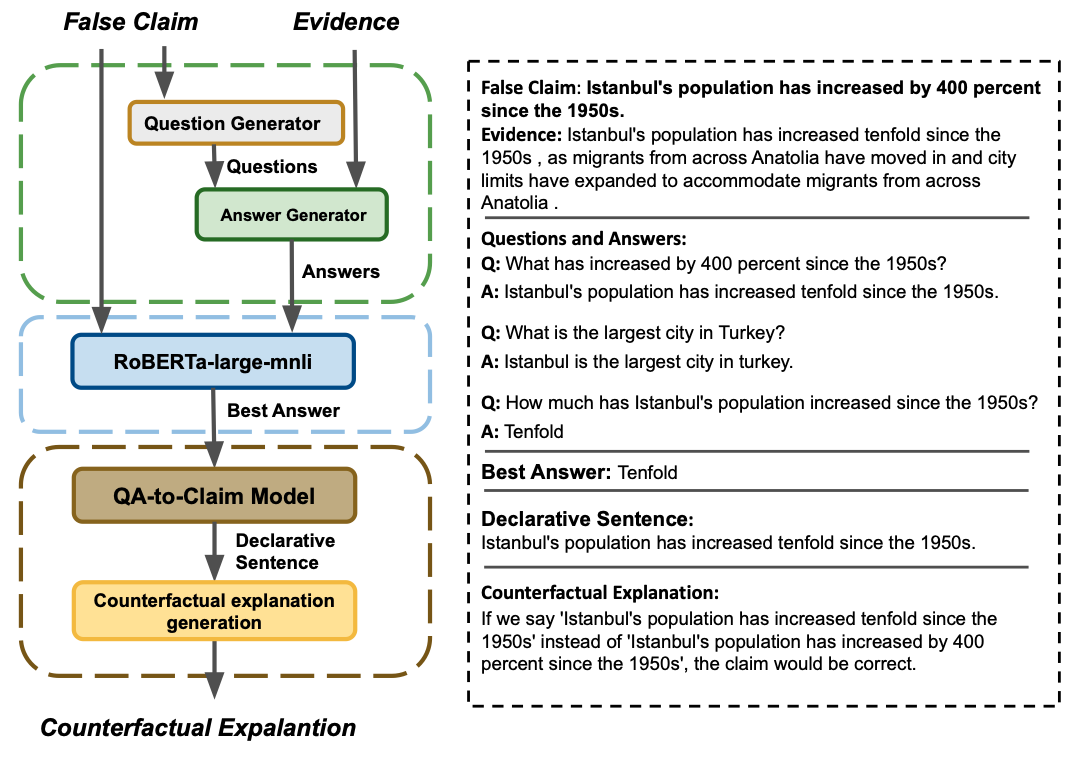
Generating Counterfactual Explanations for Fake Claims
Automated fact-checking systems have been proposed that quickly provide veracity prediction at scale to mitigate the negative influ- ence of fake news on people and on public opinion. However, most studies focus on veracity classifiers of those systems, which merely predict the truthfulness of news articles. We posit that effective fact checking also relies on people’s understanding of the predictions. We propose elucidating fact-checking predictions using counterfactual explanations to help people understand why a specific piece of news was identified as fake. In this work, generating counterfactual explanations for fake news involves three steps: asking good questions, finding contradictions, and reasoning appropriately. We frame this research question as contradicted entailment reasoning through question answering (QA).
[Paper] [Poster] [Code]
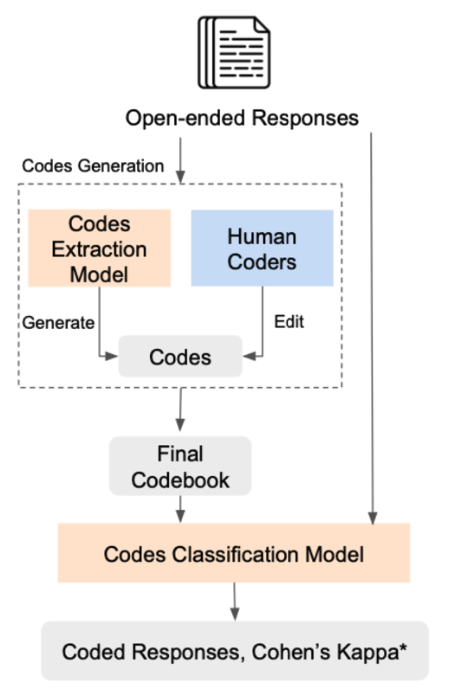
Automating Response Evaluation: A Tool for Automatic Coding Responses to Open-ended Questions
The open-ended question is a widely used method in human-subject surveys. Open-ended questions provide opportunities for discovering human subjects’ spontaneous responses to the questions. However, it is labor-intensive and time- consuming to analyze the responses. In light of the challenge, I aim to leverage NLP methods to create a tool for assisting the analysis of open-ended questions. (UT Master's Capstone Project)
[Poster] [Code]
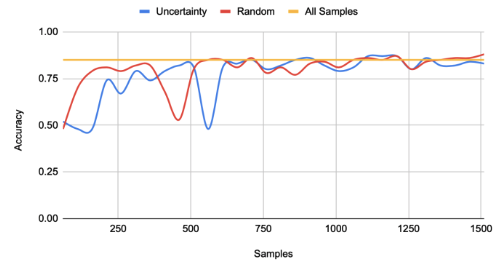
Detecting Political Ideological Leaning
This project aims
to design a human-in-the-loop classification using
active learning and rationales. The concept here
is to build a framework that predicts the political
ideology leans by the rationale provided by humans
or extracted by the machine learning model.
My parts in this project are running the ERASER
benchmark Bert2Bert model, trying active learning
with uncertainty-based query strategy and random
sampling, and implementing the random sampling baseline using Hugging Face (UT Master's Independent Study)
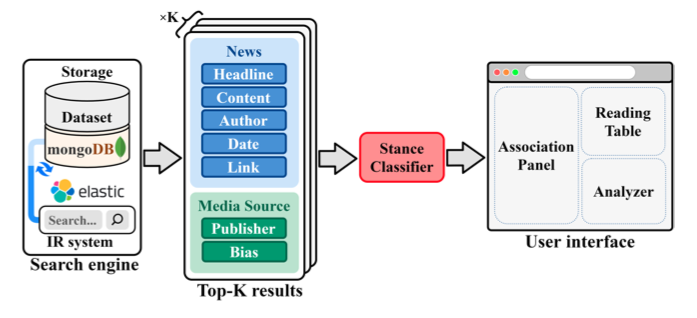
Escape from An Echo Chamber
An echo chamber effect refers to the phenomena that online users revealed selective exposure and ideological segregation on political issues. Prior studies indicate the connection between the spread of misinformation and online echo chambers. In this paper, to help users escape from an echo chamber, we propose a novel news-analysis platform that provides a panoramic view of stances towards a particular event from different news media sources. Moreover, to help users better recognize the stances of news sources which published these news articles, we adopt a news stance classification model to categorize their stances into “agree”, “disagree”, “discuss”, or “unrelated” to a relevant claim for specified events with political stances.
[Paper] [video]
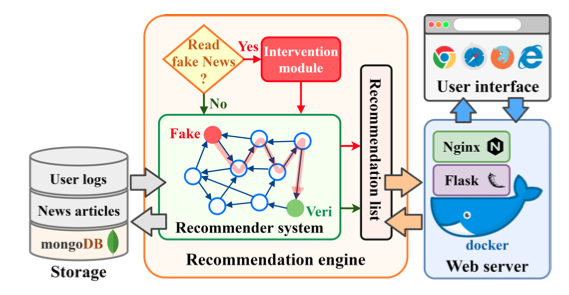
All the Wiser: Fake News Intervention Using User Reading Preferences
To address the increasingly significant issue of fake news, we develop a news reading platform in which we propose an implicit approach to reduce people’s belief in fake news. Specifically, we leverage reinforcement learning to learn an intervention module on top of a recommender system (RS) such that the module is activated to replace RS to recommend news toward the verification once users touch the fake news. To examine the effect of the proposed method, we conduct a comprehensive evaluation with 89 human subjects and check the effective rate of change in belief but without their other limitations. Moreover, 84% participants indicate the proposed platform can help them defeat fake news.
[Paper] [video]
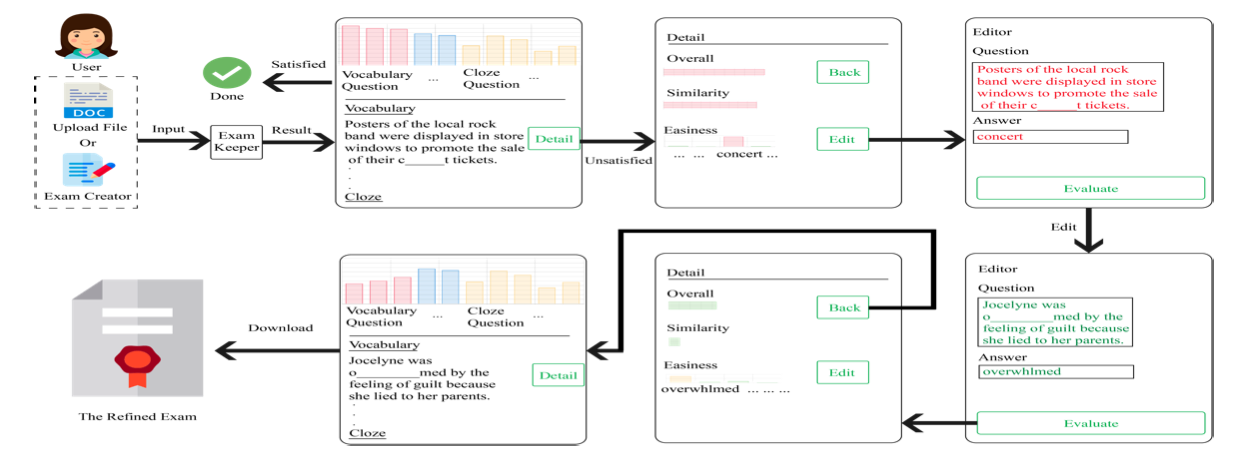
Exam Keeper: Detecting Questions with Easy-to-Find Answers
We present Exam Keeper, a tool to measure the availability of answers to exam questions for ESL students. Exam Keeper targets two major sources of answers: the web, and apps. ESL teachers can use it to estimate which questions are easily answered by information on the web or by using automatic question answering systems, which should help teachers avoid such questions on their exams or homework to prevent students from misusing technology.
[Paper] [video]
Graduation Project Competition Second Place
Project:MindReader-A Micro-moment Recommendation Mechanism API
Advisor: Prof. Yi-Ling Lin
NCCU, Taiwan, 2019
Creative Software Applications Contest Excellent Work Honorable Mention
Project:CHACHA:An App can recommend a drink for you
Advisor: Prof. Fang Yu
Ministry of Education, Taiwan, 2018